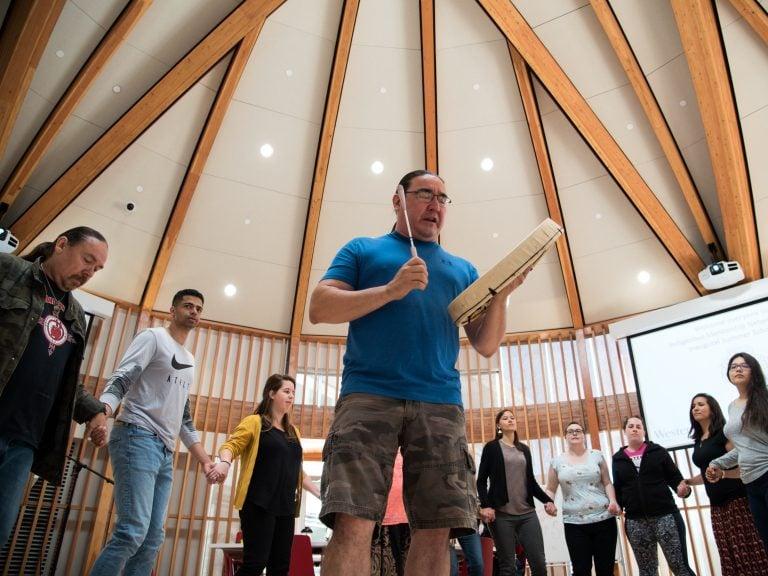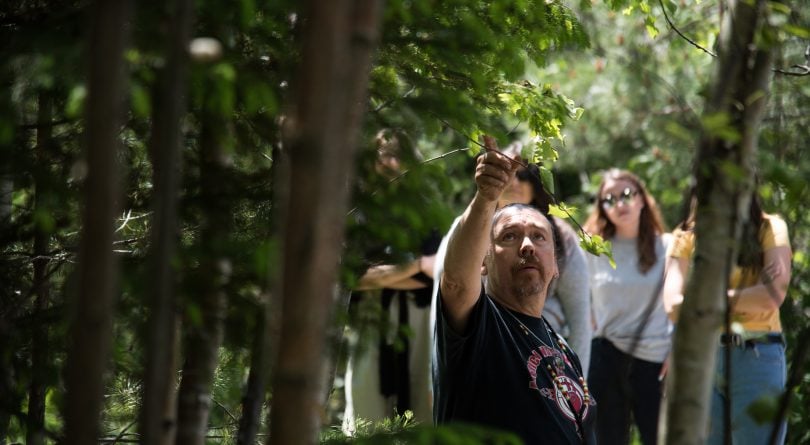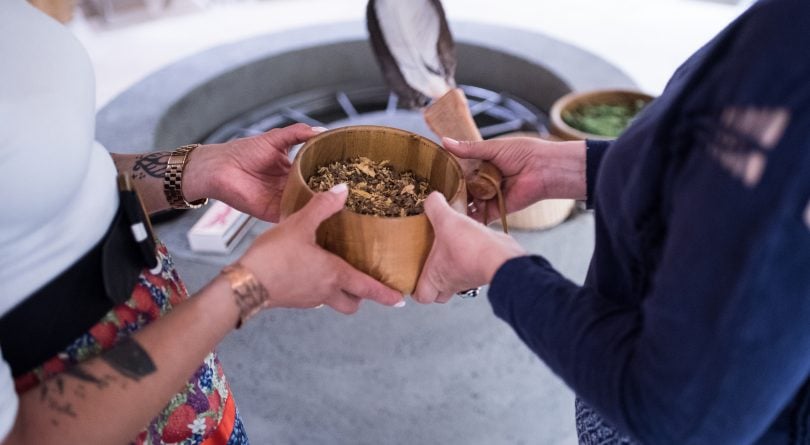A new network aims to connect and support Indigenous scholars
The program hopes to help Indigenous researchers feel less isolated and address health problems in their communities

Darren McGregor beats the drum for medicine expert Perry McLeod. (Isaac Paul)
Share
Vanessa Ambtman-Smith stands inside the Mshkikii Gamik medicine lodge that will loom large in her graduate research over the next four years.
Located on the ground floor of the Ramsey Lake Health Centre in Sudbury, Ont., the circular room—its shape a symbol of the “hoop of life”—is soft-lit with a separately vented fireplace in the centre for smudging and other traditional ceremonies. On cedar posts spaced along the wood-lined walls, the seven “grandfather teachings” of wisdom, love, respect, bravery, honesty, humility and truth are written on birchbark wall hangings. The medicine wheel colours of red, yellow, black and white trim the domed ceiling. The atmosphere is calm and serene.
Ambtman-Smith, a nêhiyaw (Cree) Ph.D. candidate at Western University, arrived in June to consult on her research about the potential of traditional healing spaces like the lodge to improve the spiritual and physical health of Indigenous patients in Canada. This cohort has been repeatedly identified by national inquiries, most recently the 2015 Truth and Reconciliation Commission, as victims of racism, non-consensual medical experiments and inequitable access to the health care system. First Nation, Métis and Inuit people have higher rates of smoking, obesity and food insecurity than the Canadian population in general, according to Statistics Canada, with other studies reporting discriminatory treatment of Indigenous patients seeking medical care.
RELATED: How Indigenous scholarship winners are busting myths and stereotypes
“I am looking at ways to reverse the harms that Indigenous people have experienced within institutions for generations,” she says. Along with mainstream academic tools of analysis, she plans to bring her Indigenous worldview, with its emphasis on collaboration and respect. There’s also a commitment to share knowledge with Indigenous communities, who have historically been treated as subjects—not partners—in health research.
As Ambtman-Smith begins her work, she embodies a new trend in higher education that connects Indigenous researchers, instead of leaving them to toil alone. Last June, she was one of 25 young scholars, mostly Indigenous, selected for Ontario’s Indigenous Mentorship Network, a summer school founded earlier this year to nurture a new generation of scholars to conduct culturally relevant research on health problems identified by First Nation, Inuit and Métis communities. With Western University as the hub for 13 research institutions and 70 researchers, and with students and community representatives across the province, the network has received funding of $1 million from the Canadian Institutes of Health Research (CIHR) and $1.2 million from universities over five years. The network’s motto is an Anishinaabe saying, “mno nimkodadding geegi,” meaning “we are all connected.”
Over the past 15 years, Indigenous scholars have participated in CIHR-funded networks to build capacity in Indigenous health research, but the new network goes much further, says Ontario program leader Chantelle Richmond.
“This is purely Indigenous-led and Indigenous-centred, and the summer school itself was rooted in ceremony,” says Richmond, an Anishinaabe scholar from Pic River First Nation, an associate professor of geography at Western and Canada Research Chair in Indigenous health and environment. She adds: “That is why this network is so important. We are raising scholars.”
At its core, the network aims to link young researchers with each other and with nationally recognized Indigenous scholars, some only five to 10 years older, who advise them on how to succeed in mainstream academia while incorporating traditional knowledge and practices in their research and improving the health of Indigenous communities. “What I am trying to do is foster in this next generation of students [the sense] that we need to not ask for permission to do the things we need to do,” says Richmond. “We just need to do it.”

At the four-day summer school held at Laurentian University, Indigenous “knowledge keepers” led the students in traditional ceremonies—storytelling, ancestral teachings, talking circles and medicine walks in the woods—to unite the young researchers with their history and the culturally relevant academic work to come. On the first day of school, in keeping with ceremonial activities, including smudging, several female Indigenous researchers wore ribbon-trimmed skirts.
What is so thrilling—and often emotionally charged—for Richmond and other mentors is the chance to guide a new generation in adopting a different research relationship with Indigenous communities, one that values, not disparages, Indigenous knowledge. “When I started my Ph.D. in 2003, we still had researchers out there who thought it was okay to use Indigenous data or work on Indigenous matters but not work with communities,” she says. “Our mentorship network is young, but we were all raised through these [earlier] networks that taught us the first priority really should be the communities. It is a moral imperative.”
That urgency also drives Jennifer Walker, Laurentian’s network lead and a summer school mentor. An epidemiologist, she holds a Canada Research Chair in Indigenous health, assisting First Nation and Métis communities in applying data on Indigenous health and health services for community-defined purposes.
“I am making sure . . . that the data are used to tell Indigenous-led stories about Indigenous lives; not the health system saying these people are sick,” says Walker, a member of the Six Nations of the Grand River. “I am using the data not to shed light on more problems but as tools for healing.”
As a young scholar in a mainstream institution, she says she was told that Indigenous research methods were not valid in mainstream epidemiology. “I was crushed because that was what I wanted to do,” she says. Over time, however, she found herself in demand by Indigenous organizations for her ability to bring an Indigenous perspective to quantitative epidemiology data, and she now belongs to an international network of like-minded scholars.
Walker says the network’s summer school—another will be held next year elsewhere in Ontario—seeks to create a community of Indigenous scholars. “Some people are coming from institutions where there is not a lot of collective energy around the role of indigeneity in academics,” she says. “If there is not a community, then people really need it . . . academia is a very competitive world, and that doesn’t jibe with Indigenous worldviews.”
MORE: Indigenous students on campus: Going past the equity handbook
Carrie Bourassa, scientific director of CIHR’s Institute of Indigenous Peoples’ Health, applauds the Western University-led network for its focus on mentoring young scholars whose work could help dismantle historic negative practices rooted in the Indian Act. “We are making progress and we are seeing real change in terms of understanding, and that is the first step to decolonization,” says Bourassa, author of a recent paper endorsing the Truth and Reconciliation Commission’s “calls to action” to address systemic racism and provide “culturally safe care” in health services. “We have to have people who understand when we say, ‘Indigenous knowledge is science.’ ”
Like their mentors, the summer school scholars express a sense of obligation, not just to earn an academic credential for themselves but to give back to their home communities.
University of Toronto clinical psychology student Shanna Peltier, a member of Wiikwemkoong First Nation on Manitoulin Island, is unequivocal when asked where she wants her research on Indigenous youth suicide to take her. “Back home,” she declares. “Ever since I decided to go to university, I have been told, ‘You go get your education and bring that knowledge back here.’ ”
She hopes her Indigenous research will help her reframe suicide among First Nations youth as a societal responsibility, not an individual tragedy. “There is a lot of work out there about how colonialism has played into suicide,” she says. “How do you expect an Indigenous youth with depression to heal if they can’t get any [clean] water?” she asks. “Can we give them a pill and expect it to help with their symptoms when they haven’t seen their families because they have to attend high school out of town?”
At the summer school, she says she found a sense of belonging that is missing in the university culture of Western knowledge. “There is something about this [network] environment where I never had to justify how I felt today,” she says. “Coming into university as an Indigenous person is literally battling colonialism every day. As soon as you walk through those doors you are stepping into a space where your identity is put on the spot.”
A determination to contribute to Indigenous communities also underpins the research of Randi Ray, an Anishinaabe from Flying Post First Nation, one of six members of the Wabun Tribal Council. A provincial practice lead for the Ontario Indigenous Cultural Safety Program, an anti-racism advocacy group, she is also a second-year educational sustainability Ph.D. candidate at Nipissing University.
READ: How Canadian universities help fight to save Indigenous languages
In her research, she plans to work with Wabun and First Nations leaders to address a problem they raised with her: how to improve on-reserve governance and leadership.
The link between effective band leadership and health care is key for Ray, one of the summer school’s nine recipients of $20,000 in research funding. “In Anishinaabe teachings, health is holistic, health is income, health is education and health is socio-economic status,” she says. “It is everything and encompassing: if you don’t have strong leadership and you don’t have that strong governance, you are not going to be healthy.”
Her research, which begins with questions posed by First Nations communities, uses Indigenous methodology and ways of thinking, doing and knowing. “I call it my learning journey, not a study, because I am trying to decolonize intentionally,” says Ray, daughter of a long-time First Nation chief. Bringing an Indigenous perspective to her research, with the approval of her university advisers, “means absolutely everything to me,” she adds.
She praises the network as “innovative” for its recognition of Indigenous knowledge, but argues it has “always been there” but is often discounted by non-Indigenous scholars. “The system we continue to value in academia is embedded in colonial practice,” she says. “That is not the only way of knowing and doing. Just because a settler wrote it down 250 years ago doesn’t mean it is more valuable than the plants and medicines we talked about today [on the first day of summer school].”
Growing up in her First Nation community, Ray says she received band support for sports and academic pursuits. Now she says it is time for her to repay the gesture. “What we talk about in terms of the Anishinaabe people is the reciprocal relationship of giving back,” she says. “It made no sense for me to do a Ph.D. that is not benefiting the communities that have benefited me all my life.”

Jason Batise, executive director of the Wabun Tribal Council, is keen to work with Ray, who he says has already demonstrated a respectful approach to working with local First Nations leaders. “That is the preferred approach, and a smart one by Randi,” he says, hopeful that her community-based research will yield “better decision-making” by elected First Nations officials. “She has spent a lot of time with her dad in the bush and she has a good grasp of her Aboriginal self and our culture,” he says. “If that is what she is going to write about in her report, that is important.”
Andrew Forbes, a non-Indigenous participant in the summer school, says exposure to another way of looking at the world “really humbles you.” A master of science in interdisciplinary health student at Laurentian, he says he wants to “learn how to do research in a respectful way that respects the knowledge and expertise of Indigenous peoples, and how to build better relationships—because relationships between white people and Indigenous people have been incredibly racist and damaging in a lot of ways.”
Back in Sudbury, Ambtman-Smith recalls her initial fears of joining the mentorship network.
She had pulled out of an M.A. program at one university in Western Canada, citing “overt racism.” Returning to Ontario, she met Western’s Chantelle Richmond, who encouraged her to pursue graduate studies (now fast-tracked to a Ph.D.) in the geography of Indigenous health. The summer school, she says, provided a safe space to open up about past experiences with racism and to learn from others.
“It has become a really beautiful relationship now that I didn’t expect,” says Ambtman-Smith, who also qualified for $20,000 in research funding through the network. “I didn’t expect how loved and supported we would be and how many people came together to encourage us to be successful. It is overwhelming.”